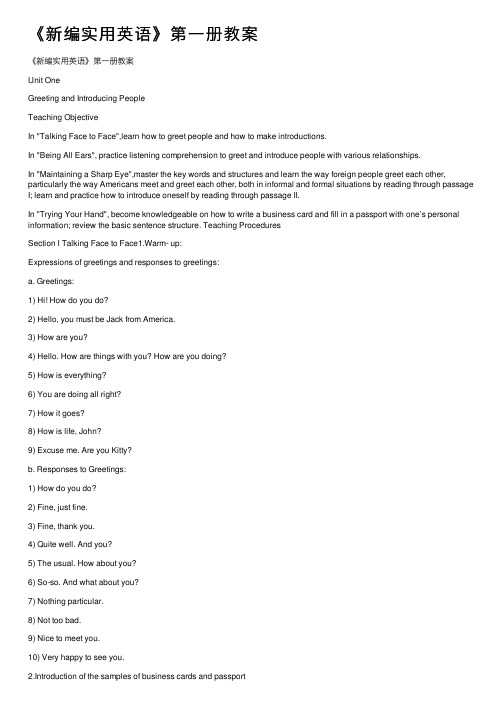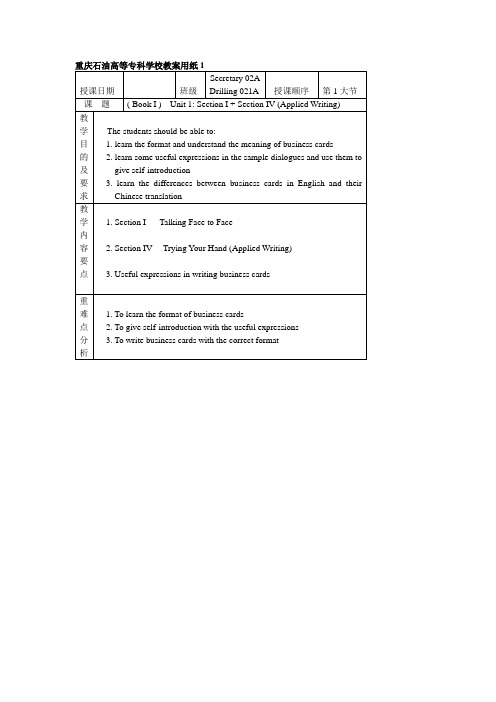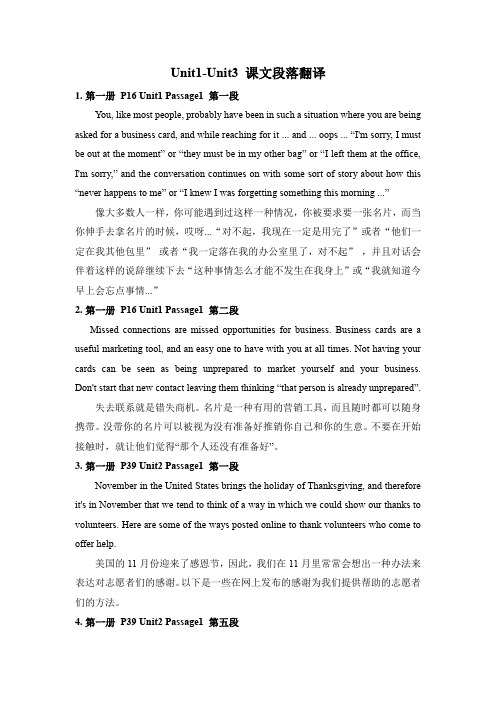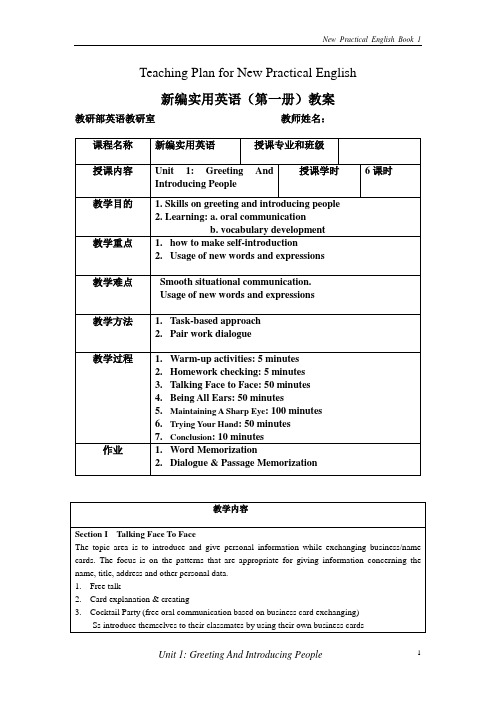Section_I_unit_1 新编实用英语一册
新编实用英语综合教程1(第四版)Unit1Hello,Hi教案

Unit 1 Hello, HiUnit Goals1.Greet people and give responses: first meeting and meeting again2.Exchange personal information: name/address/telephone number/job/study3.Introduce people to each other4.Meet people at the airport5.Say goodbye to others6.Say hello in different languages7.Write a business cardWhat should you know about1.Etiquette of meeting and introducing people2.Etiquette of exchanging business cards3.Basic sentence structuresSection I Talking Face to Face1.Imitating Mini-Talks2.Acting out the Tasks3.Studying Email Information on the Internet4.Following Sample Dialogues5.Putting Language to UseSection II Being All Ears1.Learning Sentences for Workplace Communication2.Handling a Dialogue3.Understanding a Short Speech / TalkSection III Trying your Hand1.Practicing Applied Writing2.Writing Sentences and Reviewing GrammarSection IV Maintaining a Sharp EyePassage 1 :Information Related to the Reading PassageEnglish Expressions Borrowed from FrenchOver the long years, the English language has borrowed a great number of French words or expressions. Some of them have been so absorbed in English that speakers might not realize their origin. Other expressions like “faux pas” have retained their “Frenchness”, with which spe akers tend to sound modern. These expressions are often written in italics. The following are a few French expressions which are commonly used in English.1. Faux Pas: It refers to a socially awkward or tactless act, a foolish mistake, something that should not be done. 失礼2. au pair: A foreign female student who works for a family (cleaning and/or teaching the children) in exchange for room and board. 帮助料理家务换取住宿的外国女学生3. Bon appétit: The closest English equivalent is “Enjoy your meal” . 用餐愉快4. esprit de c orps: It is similar to “group spirit” or “morale”. 团队精神5. rendez-vous: In English it means “go to”. It can be used as a noun or a verb. 约会6. RSVP: This abbreviation stands for Répondez, s'il vous plaît, which means “Respond, please”.敬请回复7. bon voyage: a way of saying goodbye and wishing good luck 一路平安The Business Card: a Social Faux PasYou, like most people, probably have been in such a situation where you are being asked for a business card, and while reaching for it ... and ... oops ... “I'm sorry, I must be out at the moment” or “they must be in my other bag” or “I left them at the office, I'm sorry,” and the conversation continues on with some sort of story about how this “never happens to me” or “I knew I was forgetting something this morning ...”Missed connections are missed opportunities for business. Business cards are a useful marketing tool, and an easy one to have with you at all times. Not having your cards can be seen as being unprepared to market yourself and your business. Don't star t that new contact leaving them thinking “that person is already unprepared”.“Never leave home without it ...” There are so many things we often have to remember in this go-go world we are living in … but your business cards should ALWAYS be with you.Here are a few tips for you to go take care of this right now, so youdon't get caught in this situation:✧ If you don't have a job, get Networking Cards.✧ If you are employed, and haven't had new cards in 2 or more years,it couldbe time for an update: info update and photo update ...✧ Perhaps set a goal of handing out 5 cards a day.✧ Practice what you will say when handing them out. On a daily basis, thereare so many opportunities to do so. Grocery store lines, coffee shops, waiting on your car wash, meetings, and even the dog park!✧ Ask your network to network with and for you also by handing out a few!Work smarter, not necessarily harder!Language Points1 Explanation of Difficult Sentences1. (Para. 2) Missed connections are missed opportunities for business.Analysis: Missed is a verb's past participle used here as an adjective.The repeated use of the same word could bring out a stronger effect. Translation: 错失了联系就错失了商机。
新编实用英语综合教程Unit 1

Unit 1 Hello, Hi!一、本课及各部分的教学目的及重点二、具体教学过程Section ⅠTalking face to face (Room Reservation) Useful Sentences(该环节首先播放教学视频,使学生对寒暄和交流过程有直接的认识。
然后教师将见面寒暄和交流的相关表达进行讲解后,学生自由模拟训练为主,重在帮助学生循序渐进地从单个句型到连贯对话进行过渡。
此时,教师不用对学生要求过高,可以先从模仿练起,鼓励学生举一反三。
)Section II Grammatical Item – Sentence Structures(句子结构)1.基本句型结构:(主+谓)结构、(主+谓+宾)结构、(主+谓+宾+宾补)结构、(主+系+表)结构(1)(主+谓)结构主谓结构的句子的谓语动词是不及物动词,后面不接宾语。
The sun rises. 太阳升起来了。
He died. 他死了。
She smiled. 她笑了。
(2)(主+谓+宾)结构主谓宾结构的谓语动词多数为及物动词,如果是不及物动词,需先加个介词,然后才可接宾语。
I love my hometown. 我爱我的家乡。
(及物动词)I dislike traveling. 我不喜欢旅游。
(及物动词)He is waiting for her. 他在等她。
(wait是不及物动词,后接for)(3)(主+谓+宾+宾)结构My father sent me a new bike as my birthday present. 我的爸爸送了我一辆新自行车作为生日礼物。
(me作间接宾语,bike作直接宾语)(4)(主+谓+宾+宾补)结构His words made me moved. 他的话叫我感动。
(过去分词作宾补)I find the novel very interesting. 我发现这部小说很有趣。
(现在分词作宾补)My manager asks me to do the work. 我的经理叫我做这项工作。
新编实用英语1册Unit1PPT

Mr. [ˈ mɪstə] 先生
Miss[mis] 小姐 (未婚)
Mrs.[ˈ mɪsɪz] 夫人 (已婚) Ms. [miz] 女士 (不清楚对方是否结婚)
Meeting People for the First Time
Hello ,
Mr. David Green ! I’m Lily Zhang.
●
we always say:
How are
you
Meeting again
What do you always say?
*Hi , long time no see. *So glad to see you again. *How nice to meet you here! *Haven’t seen you for ages . How’s everything? *What a nice surprise ! What brings you here?
Unit one
◇
What is the common way for Chinese people to greet others?
How do Americans greet each other?
we always say:
●
How do you do? Hello ,nice to meet you . Glad to meet you.
party,Mrs.Lin. We really had a very good time.
B:I’m glad you enjoyed it. A:Thanks for inviting me. B:Thanks for coming.
*Meet Prof.Wasts at the airport. *Exchange business cards with Mr.Green. *Introduce an English teacher to your classmate. *Greet your business partner, Mr. Johnson, at a trade fair. *Take leave and say goodbye to your hostess,Mrs.Waters.
《新编实用英语》第一册教案

《新编实⽤英语》第⼀册教案《新编实⽤英语》第⼀册教案Unit OneGreeting and Introducing PeopleTeaching ObjectiveIn "Talking Face to Face",learn how to greet people and how to make introductions.In "Being All Ears", practice listening comprehension to greet and introduce people with various relationships.In "Maintaining a Sharp Eye",master the key words and structures and learn the way foreign people greet each other, particularly the way Americans meet and greet each other, both in informal and formal situations by reading through passage I; learn and practice how to introduce oneself by reading through passage II.In "Trying Your Hand", become knowledgeable on how to write a business card and fill in a passport with one’s personal information; review the basic sentence structure. Teaching ProceduresSection I Talking Face to Face1.Warm- up:Expressions of greetings and responses to greetings:a. Greetings:1) Hi! How do you do?2) Hello, you must be Jack from America.3) How are you?4) Hello. How are things with you? How are you doing?5) How is everything?6) You are doing all right?7) How it goes?8) How is life, John?9) Excuse me. Are you Kitty?b. Responses to Greetings:1) How do you do?2) Fine, just fine.3) Fine, thank you.4) Quite well. And you?5) The usual. How about you?6) So-so. And what about you?7) Nothing particular.8) Not too bad.9) Nice to meet you.10) Very happy to see you.2.Introduction of the samples of business cards and passport3. Practice the two dialogues in Follow the Samples4. Practice dialogues according to the given tasks5. ExercisesSection II Being All EarsSee the textbook.Section III Maintaining a Sharp EyePassage I The Way Americans GreetText-Related Information1. GreetingThe simplest thing to say is "Good morning," "Good afternoon'" or "good evening." This greeting is given to one whom you know only slightly, or to any one you are passing quickly. "How are you" is usually used when you are not in such a hurry. No answer is expected other than "Fine, thank you." "Hello" is the commonest form of greeting between good friends.2. When to Shake HandsIt is customary to shake hands when you first meet someone. And usually friends shake hands when they meet after not having seen each other for some time. However it is not necessary to shake hands.3. Common Titles in Englisha. Mr.:“先⽣”a courtesy title for any male adult not styled “Sir”, “Dr.” etc. used before the man’s family name or his position.b. Mrs.:“太太”a courtesy title for any married woman not styled “lady”, “Dr.”etc. used before her husband‘s surname.c. Ms.: “⼥⼠” a courtesy title for a woman, whether she is married or not, followed by the family name.d. Miss: “⼩姐”A title used to address an unmarried woman or a girl. It is followed by the family name. Miss can also be used as the title of address to an (esp. unknown) unmarried woman. In this case, it is not followed by the name.e. Lady: “夫⼈、太太、⼥⼠”a courtesy title for a woman with dignity or social grace. It is also an English title for the wife of a knight or a baronet.f. Dr. (Doctor): “医⽣、博⼠”the title of a medical practitioner or the title of the holder of the highest university degree. e.g. Doctor of Philosophy (PhD).g. Prof. (Professor):“教授”The title to address a university teacher of the highest rank in a faculty.h. Officer: “官员,警察先⽣” The title to address a person holding a publicappointment, aposition of responsibility and trust, such as a policeman or a customs officer.i. Sir: “先⽣、长官、爵⼠”A form of polite address to a man; A title preceding the first name of a knight (爵⼠) or a baronet (准男爵); A form of address in writing to a stranger or in business letters.4. Formation of Common English NamesA common English name is usually composed of two or three parts: the first name is also called forename. If the person is a Christian, his first name will be given at his baptism, so it is also called the given name or the Christian name. Middle name is the second given name. When written, middle name is often shortened to the initial letter. Surname is often the father‘s family name, so it is also called family name or last name. For example: Anne Louise Strong, George B. Show.Text ExplanationPara. 1Americans often greet each other simply with “Hello”or “Hi”. They believe such an informal greeting often implies a close and friendly relationship. Similarly, Americans do not have a formal “farewell”. They will just wave “good-bye” to the whole group. Or perhaps, they will simply say “Bye”, “So long” or “Speaking of time, I’ve got to run” and then leave. To Americans, a friendly and informal relationship is themost important thing.Language Points:1.Explanation of Difficult Sentences1) The Way Americans GreetAnalysis: In this title, in which is omitted after The way.“in ... way”means (to do something) by means of a certain method. Translation: 美国⼈的致意⽅式Example: I think the way she runs her bookshop is worth studying.2)Speaking of ... time, I’ve got to run.Analysis: A present participle clause used as an adverbial of cause/time. It means “when it comes to time, I’m reminded of …”Translation: 说到时间,我得赶紧跑了。
《新编实用英语》第一册_基础英语

Unit One (1)Section I--- Talking Face to FaceI. Getting ready for the task1. Warming-upThe teacher asks some questions to arouse the students’ interest in the task.1) What elements are essential when introducing oneself to others?2) What usually makes you like or dislike someone when you first meet him or her?3) What is the most important thing that you think can make others be friendly toyou when you first meet with them?4) What do you think is important for a teacher to make his or her studentsinterested in the study of the course?5) Do you often have the correct impression of other people after checking withtime?6) How do you usually behave when first meeting someone? Why do you behaveso?2. Self-introductionThe teacher introduces himself/herself with the big business card that has been put on the blackboard.II. Presentation of the new material1. Business Cards and Passport1. Reading aloudThe students read the business cards carefully and try to understand their meanings and learn the format.2.Checking understandingThe teacher asks questions to check the students’ understanding of the business cards they have just read. The questions listed below may help the students better understand the cards.1)What information should be included in a business card?2) What do you think is the most important information on abusiness card?3) Where should you print your name and title?4) Where should you print the name of your unit, such as your company / college /school / factory / …?5) Is it a god idea to print your home address on a business card?Why or why not?3. Reading the samplesThe students practice reading the sample dialogues in pairs, pick out some useful expressions or sentence patterns in the dialogues and then try to learn them by heart. The following are only a few of them.1) My name is…/ I’m …2) Please call me…3) Welcome to…4) Here is…5) Long time no see. / Haven’t seen you for ages.6) What a pleasant surprise!7) What brings you here?8) How are things going in your company?4. Acting out1) The students are given a few minutes to practice one of the five dialogues on p 3and then come to the platform and act out in pairs.2) The students get to know each other by giving self-introductions with the learneduseful expressions.5. Putting in useThe students finish doing Ex. 1, 2 and 3 on p. 4 with what they have just learned. 2. Section IV---Applied Writing1. Study the samplesThe students study the sample business cards in Section IV, paying special attention to the format of them.2. Simulate and translate1) The students try to translate the business card in Ex. 2 + 3, trying to learn thedifferences between business cards in English and in Chinese.2) The students finish filling in the passport in Ex. 4 on p. 15 with the guidance andhelp of the teacher.3. Simulate and write1) The students try to write a business card with the information given by theteacher.2) The students design and write a business card with their own information.3. Comments and conclusion1. The teacher gives a short summary of what has been learned in this period.2. The teacher comme nts on the students’ performance in this period.III. Assignment1. The students Review what has been learned by preparing a dialogue forpresentation in next period2.Finish reading two passages from “Fast Reading”3. Listen to materials in Section II and preview Passage IUnit One (2)Section III----Passage II. Revision1. The teacher guides the students to review what they learned last period by asking them some questions.2. The teacher checks the students’ assignment.II. Presentation of the new materialI. Getting ready for the task1. Related information to Passage I1) Common titles in EnglishCommon titles in English refer to Mr., Mrs., Ms., Miss, Lady, Madam, Sir, Dr., Prof. and officer. The teacher is to tell the students the differences of these titles and their respective usage.2) Formation of common English namesA common English name is usually composed of two or three parts: the first name, the middle name and the last name. The first name is also called forename. If the person is a Christian, his/her name will be given at his/her baptism. So it is also called the given name or the Christian name. Middle name is the second given name. When written, middle name is often shortened to the initial letter. Surname is often the father’s family name, so it is also called family name or last name. For example, Anne Louise Strong, George B. Show.2. Learn the new words and expressions1) Some students are asked to read a few of them by turns.2) The teacher corrects the students’ mistakes in pronunciation.3) The students read them together.3. Warm-up questionsThe teacher asks some questions to arouse the students’ interest in the passage and to see how much they know about the greeting of western people, especially Americans. Here are some of the questionsasked by the teacher.1) Have you ever met and greeted some foreigners you are not quite familiar with?2) How do you usually greet them?3) What do you usually say to them after the greeting?4) What questions do you think should be avoided when meeting someone for thefirst time? Why?II. Study Passage I: The Way Americans Greet1.Read and respondThe students skim over the passage to get its main idea and then answer the following questions based on the information they get from the passage.1) How do most Americans greet people they are not familiar with?2) How do they greet their friends?3) What do they usually say to someone they meet for the first time?4) What are the usual topics for strangers to talk about?5) What questions are considered impolite or offensive for new acquaintances totalk about?6) What questions are considered suitable for most occasions?7) Are there any differences in the ways Europeans and Americans address eachother? What are they?8) What do most Americans prefer to be addressed?2. Read and complete1) The students reread the passage and then finish doing Ex. 1, 2 and 3 withoutreferring back to it.2) Finish doing Ex. 4 on p. 10.3.Read and analyzeThe teacher guides the students to analyze the structure of the passage by completing the outline below.The Way Americans GreetI. Informal greetingsA. Simple and shortB. FriendlyII. Proper introductionsA. Prefera. Simple and informal introductionsb. First namesB. Dislikea. Formal introductionsb. Formal titlesc. Last namesIII. Questions or topicsA. Can be personalB. Expect answers to the questions4. Read and explainThe teacher encourages the students to give suitable explanations to some difficult sentences in the passage.1) (Title) The Way Americans GreetAnalysis: In this title, in which is omitted after The Way. “in…way” means (to do something) by means of a certain method.Translation: 美国人的致意方式。
新编实用英语1PPT课件

赵娟
教育部2000年颁布了《高职高专教育英 语课程教学基本要求(试行)》。明确了职业 技术院校所开设的高职英语课程的主要教学目 标就是培养学生实际应用英语的能力,培养实 用性人才,教学方向是以应用为目的,实用为 主,够用为度。根据《基本要求》,并结合我 校学生具体情况,最终选择高等教育出版社 2002年出版的《新编实用英语——综合教程》 作为我校高职英语课程的主要教材。
3.Act Out
此项编排的目的是为学生提供模
仿套用所学对话样例的小语言环境。 在学习5个短小精炼,生动有趣,针对 性强,主题突出的小对话之后分别设 定了一个相关的交际“任务”。教师 可引导学生根据上文样例进行口头交 际的模仿套用练习,取得边学边用的 效果。
Put in Use
此项训练一般含3项练习,要求在课上口头完 成。其编排意图如下:
《新编实用英语》由《综合教程》, 《学学·练练·考考》,《教师参考书》以及 配套的多媒体学习课件,电子教案,网络课 程等组成。
《新编实用英语——综合教程》分为四 册,每册修订后缩编为八个单元。每个单元 都由说(Talking Face to Face),听(Being All Ears),读(Maintaining a Sharp Eye), 写(Trying Your Hand)四部分组成,另有 一个“趣味阅读”部分(Having Some Fun)。各部分的具体内容如下:
此部分也可与Applied Writing结合起来 进行教学,使学生能够看懂应用文样例,了 解其结构特点和语言形式,并能模拟套写简 单的应用文。
2.Follow the Samples
这里提供的对话样例是紧扣本课 交际话题编写的,其目的是为学生学 习该话题的口头交际提供模仿的样本, 故教师应引导学生首先学习样例,达 到能流利朗读和熟记常用词语和句式 的程度,为下一步模拟套用做好准备。
新编实用英语综合教程(第四版)上册 Unit1-Unit3 课文段落翻译

Unit1-Unit3 课文段落翻译1.第一册P16 Unit1 Passage1 第一段You, like most people, probably have been in such a situation where you are being asked for a business card, and while reaching for it ... and ... oops ... “I'm sorry, I must be out at the moment” or “they must be in my other bag” or “I left them at the office, I'm sorry,” and the conversation continues on with some sort of story about how this “never happens to me” or “I knew I was forgetting something this morning ...”像大多数人一样,你可能遇到过这样一种情况,你被要求要一张名片,而当你伸手去拿名片的时候,哎呀...“对不起,我现在一定是用完了”或者“他们一定在我其他包里”或者“我一定落在我的办公室里了,对不起”,并且对话会伴着这样的说辞继续下去“这种事情怎么才能不发生在我身上”或“我就知道今早上会忘点事情...”2.第一册P16 Unit1 Passage1 第二段Missed connections are missed opportunities for business. Business cards are a useful marketing tool, and an easy one to have with you at all times. Not having your cards can be seen as being unprepared to market yourself and your business. Don't start that new contact leaving them thinking “that person is already unprepared”.失去联系就是错失商机。
新编实用英语一册1单元教案

Sir: a form of polite address to a man; a title preceding the first name of knight or a baronet; a form of address in writing to a stranger or in business letter.
eg. That sounds rather suspicious to me.
It costs $10, and to some people that’s a lot of money.
(10) will: shows what always happens
eg. Oil will float on water.
新编实用英语新编实用英语第三版新编实用英语1新编日语第二册教案新编日语教案新编大学实用英语新编实用英语unit3新编基础会计教案小学英语教案英语教案
Teaching Plan for New Practical English
新编实用英语(第一册)教案
教研部英语教研室教师姓名:
课程名称
新编实用英语
授课专业和班级
Mr.: a courtesy title for any male adult not styled “Sir”, “Dr.”, etc, used before the man’s family name or his position.
MRS.: a courtesy title for any married woman not styled “Lady”, “Dr.” etc. used before her husband’s surname.
- 1、下载文档前请自行甄别文档内容的完整性,平台不提供额外的编辑、内容补充、找答案等附加服务。
- 2、"仅部分预览"的文档,不可在线预览部分如存在完整性等问题,可反馈申请退款(可完整预览的文档不适用该条件!)。
- 3、如文档侵犯您的权益,请联系客服反馈,我们会尽快为您处理(人工客服工作时间:9:00-18:30)。
Dialogue 2
Mary: Hey, Helen. Haven‟t seen you for ages. Helen: Oh, hi, Mary. Yeah, it has been a long time. How‟s everything? Mary: Not too bad, thanks, and you? Helen: Pretty good, thanks. Mary: I‟m sorry I‟m in a hurry right now. Helen: OK. See you some other time, huh? Mary: Yeah, let‟s get together sometime. Take care. Helen: You too.
Unit 1
Greetings and Introduction
Overview:
Lead-in Warm-up Activities Dialogues Vocabulary Useful Expressions Exercises Culture Tips Class Activities
Dialogues
Dialogue 1
Doris: How‟s life these days? Steve: Mmmm, just OK. And how are you? Doris: Pretty good. Nice weather today, isn‟t it? Steve: Yes, it‟s good for doing some exercises. Doris: How about going jogging together? Steve: Good idea! Let‟s enjoy the sunshine! Doris: Let‟s go.
Dialogue 4
Wu Ping: Hi, Liu Yun, nice to see you here. Liu Yun: Hi, good to see you! How are you? Wu Ping: Not bad. May I introduce you to our manager, Mr. Smith? Liu Yun: How do you do, Mr. Smith? Mr. Smith: How to you do, Liu Yun. Nice to meet you! Liu Yun: Nice to meet you, too. Welcome to China. Mr. Smith: Thanks. Your oral English is very good! Liu Yun: Oh, thank you for saying so. I am flattered! Here is my business card. Mr. Smith: Thanks. This is mine. Liu Yun: I hope you will enjoy your stay here. Mr. Smith: I bet I will.
Warm-up Activities
I. Read the following words and find the pronunciation rules for letter “a” .
1. [ei] shame 2. [æ ] back plat sad chase fat tape lamp trace fan
Dialogue 3
Jason: Hello, Thomas. It‟s good to see you. Have you met Mr. Li? Thomas: No, I don‟t believe I have. Jason: Mr. Li, I‟d like to introduce Thomas. Thomas is our business partner. And Thomas, Mr. Li is our new sales manager. Thomas: I‟m very happy to meet you, Mr. Li. Mr. Li: It‟s my pleasure, Thomas. Jason: He is the General Manager of the Beijing branch.
Dialogue 5
(On the first day of a new semester: the new English teacher, Susan, is asking the students to introduce themselves.) Teacher: Who would like to introduce himself, first? Jeffery: My name is Jeffery. I‟m from Yantai, a beautiful coastal city in Shandong province. There are three people in my family, my father, my mother, and I. I like playing basketball very much. Teacher: I think we‟ve already known something about you. But, I still wonder why you choose business English as your major? Jeffery: Because I love English and it is a hot major for undergraduates seeking decent and better- paid job. Besides, working in international trade has always been my ultimate career goal. Teacher: Oh, great. Thank you for your introduction.
II. Read the story below and pay attention to your pronunciation and intonation.
The easiest way to introduce people is simply to mention their names. For example, “Mr. Brown, Mr. Carter.” Try to pronounce the names slowly and clearly. Usually, one should introduce the younger person first to the older, “Grandma, please meet Alice and Carlos Steward, my neighbors.” Or introduce a male first to a female, say “Mrs. Clark, I‟d like you to meet Dr. Martin Slater. He works in General Motor. Mrs. Wanda Clark teaches Grade 4 at Cambridge University.” In the United States it‟s customary(习惯 的) for men to shake hands when meeting each other. If not, he should simply bow slightly. Men always stand up when being introduced while women remain seated. However, a young woman should stand when being introduced to a person much older than her or in a higher social position.
Lead-in
How do you greet your friends on campus? Discuss it with your partner. You may use the following examples for help:
Student A: Hello,. How’s everything going? Student B: Not bad. How about you? Student A: Hi. Nice to see you here. Student B: Nice to see you, too.
Dialogue 6
Host: Good evening, everyone. Welcome to the English Contest. The first contestant is Peter. Peter, would you please introduce something about yourself to us? Peter: OK, thanks. Hello, everyone! My name is Peter. I come from a Foreign Language School in Beijing. It is really a great honor to have this opportunity to participate in this contest. I‟m an active and smart boy. My favorite subject is English. I like it very much. I‟ll try my best to give you a good performance this morning. Hope you can support me! Thank you! Host: Thank you, Peter. Wish you success!
